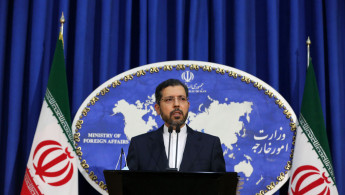Iran denounces Kuwait-Saudi deal to develop disputed gas field, calling it 'illegal'
Iran on Saturday branded "illegal" a deal reached between Kuwait and Saudi Arabia to develop a disputed gas field in the Gulf, insisting on its right to also exploit it.
The energy ministers of the Gulf Arab states signed an agreement on Monday to develop the Arash/Dorra gas field, according to an official Kuwaiti statement.
The move comes with energy prices soaring on world markets in the wake of Russia's invasion of Ukraine.
Iran's foreign ministry dismissed the agreement as "illegal" on Saturday, saying it was "contrary to current procedures and previously held negotiations".
"The Islamic Republic of Iran reserves its right to exploit the Arash/Dorra gas field," the ministry's spokesman Saeed Khatibzadeh said in a statement.
"Any action for the operation and development of this field must be done in coordination with and cooperation of all the three countries".
The dispute dates back to the 1960s, when Iran and Kuwait each awarded an offshore concession, one to the former Anglo-Iranian Petroleum Co., which became part of BP, and one to Royal Dutch Shell.
The two concessions overlapped in the northern part of the field, whose recoverable reserves are estimated at some 220 billion cubic metres (seven trillion cubic feet).
Iran and Kuwait have held unsuccessful talks for many years over their disputed maritime border area, which is rich in natural gas.
The Kuwaiti statement said the field was expected to produce one billion cubic feet of natural gas per day with 84,000 barrels of condensate daily.
Khatibzadeh said Iran was "ready" to discuss with Kuwait and Saudi Arabia "how to exploit the joint field" whose largest part, which is not demarcated, is located on the Saudi-Kuwaiti common maritime border.
Iranian drilling of the field in 2001 spurred Kuwait and Saudi Arabia to agree on a maritime border deal which stipulated that they jointly develop the natural resources of the offshore zone.





 Follow the Middle East's top stories in English at The New Arab on Google News
Follow the Middle East's top stories in English at The New Arab on Google News


